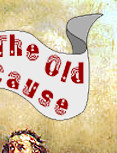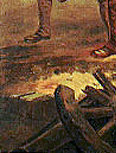|
The
concern over millennia owes much to the heretical Christianity
of Joachim of Floris (or Fiore). (See Clifford
F. Thies, "The Year 2000" at mises.org.)
Conservative "liturgical" churches don't seem
to worry much, even about the millennium. (It
will happen when it happens.) It is said that those
who do worry about end-times are of two schools. Pre-millennialists
, as I understand it, expect a horrible conflagration – along with a drought, a famine, and a flood (as Fred
J. Eaglesmith would say), and re-runs of speeches by
US presidents – to break out and destroy life as we
know it. The usual, expected place of origin is the
Middle East. This could at least explain US policy there.
Perhaps a cadre of premils are in charge, working hard
to bring on Armageddon. Maybe not. The postmillennialists
hold that right-thinking people must establish a thousand
year reign of goodness to precede the return of Christ.
Reformers of this stripe were the great bane of 19th
century US politics and the scourge of drinkers into
this century. Along the way, the postmils forgot all
about God and theology, but their secularized heirs – from Woodrow Wilson to the present permanent regime – still want to fix everything, save everyone, and remove
all temptations and occasions for (secular) sin, all
of which keeps them rather busy but makes others look
around for a free country to which to flee. The good
news is that, if we date these efforts from the 1890s,
there are only 900 more years of reform left.
DECADES
AND DECADENCE
The
habit of thinking of decades and even centuries as having
discrete characters which can be summed up with a label
may have its uses, but is subject to abuse. Was there,
for example, really a "decade of greed" overseen by
Ronald Reagan (presumably because Republicans are greed-friendlier
than the party of endless compassion)? I can't say.
Certainly, money was made on hog futures (if that's
the right expression) and funny real estate deals in
a marginal Southern state. And seen from another angle,
as Lew Rockwell remarks, government was rather hoggish
in the eighties, making it reasonable to speak of a
decade of "government greed." That would make the nineties
the decade of government that doesn't see any reason
for independent centers of social power to exist at
all. With the party of free school lunches and aerial
sorties in power, everything would be as nice and orderly
and peaceful as a government-run American high school,
if it weren't for those right-wing loonies stirring
up discontent. And what about the sixties, whose roots
were in the late 1950s and which didn't play out until
the fall of Saigon? Is that a decade?
CENTURIES,
YEAR-HUNDREDS, AND SAECULA
So
much for decades, then. Centuries are tougher to brandmark.
Benito Mussolini wrote in his famous essay on fascism
in the Enciplopedia Italiana that the 20th century
would be "the century of the state." Score
one for Il Duce. Whether this would be good,
was another matter.
A
few years ago the conservative historian John Lukacs
wrote that the 20th century had been "short" in terms
of its political-historical contours. It had run from
1914 to 1989, the years of civil war within western
civilization and the rise and fall of Soviet communism,
which the mass slaughter of World War had made possible.
Hence, the world of the early 1990s resembled that of
1913 – not the worst world possible. It was an interesting
"moment," but even Lukacs could not have foreseen how
quickly the present U.S. leadership and their Euro-lackeys
could completely screw up a chance to start over.
FANDY-SICKLE
FOLLIES
Of
course, the late 19th century, which gave way to unparalleled
bloodshed and state terrorism from 1914 on, was not
altogether perfect, either. One hundred years ago, in
1899, two imperialist wars were raging which helped
foretell the course of the coming century. In South
Africa, the British – shocked that a "defeated" foe
would go on fighting – were learning all about guerrillas
and taking up counter-insurgency tactics, including
concentration camps, to defeat them. In the Philippines,
the US army was teaching good government and orderly
behavior to unruly Filipinos only just liberated from
the cruel and arrogant Spanish dons. In both cases,
the empires – one well-established, the other aspiring
to greatness – widely advertised their high morals and
humanitarian motives. Britain fought for the undisputed
right of a gold-seeking rabble to vote in the Boer republics'
elections and overturn the locals' entire way of life,
as soon as these interlopers had a majority, and, I
suppose, because the Afrikaners were abusing the help
(something British subjects would never do, at least
not without making it pay a whole lot better). The Americans,
for their part, only wanted to bring modern sanitation,
sound public administration, Yankee school-marms, and
social workers to their "little brown brothers" in the
far-off islands.
In
the end, both countries were devastated; 26,000 Boer
women and children died in British camps, while some
200,000 Filipinos died in the course of what the US
chose to call the "Philippine Insurrection." An odd
choice of words: Southerners were said to have "rebelled";
it's Indians that have "insurrections." But,
even so, great evils were doubtless averted. Britain's
sea route to India was now extremely secure (as opposed
to very secure) and no one abused the help in South
Africa ever after, as we well know – at least until
that evil time begun by Dr. Verwoerd and ended by Nelson
Mandela (as shown by the good Bishop's report). The
United States had saved the poor Filipinos from falling
into the hands of those terrible Germans, who would
have done ghastly things, perhaps even killing Filipinos.
NOBODY
HERE BUT US POULTRY
None
of this, thank God, had anything at all to do with gold
and diamond fields in South Africa, athwart whose full
exploitation (by the sort of chaps the chaps can trust)
the Boer republics were seen to stand, or with American
policy-makers' oft-spoken desire to use the Philippine
Islands as a jumping-off point to the much-needed China
market. The imperial mind kept its moral and economic
compartments fairly separate, especially in public.
As befits a simpler time, the British and US popular
press sometimes appealed to the sheer joy of fighting,
the rush felt when giving the wogs a good thrashing,
and other martial music. In our time, we hear only a
faint echo of that spirit in the constant, moronic,
but popular American references to "kicking [this or
that foreign villain's] ass." Not much raw material
there for an aspiring American Kipling, I'm afraid.
Someone please break the sad news to the Weekly Standard.
WAVES
AND FUTURES
That's
what comes of looking at what was going on exactly a
century ago. It would be fun to have a sort of joint
Boer War/Philippine Insurrection centennial celebration
before time runs out. I'll try to find a vierkleur
flag to bring. Actually, some of those flags were in
evidence at the Democratic convention of 1900, carried
by a few democrats who imagined 1) that the Boers were
fighting against imperialism and that 2) imperialism
was generically bad. True enough, but the two wars did
add to the growing Anglo-American sense of being in
it together, although there was some disagreement as
to who would be the senior and who the junior partner
in the brave new world order of the 20th century. Now,
after all those wasted Rhodes scholarships, we know,
even if Tony Blair hasn't quite gotten it. Having seen
the Boers and Filipinos defeated, the great powers failed
to draw the lesson that guerrilla war might have a future.
Then came World War I, which – aside from numberless
other evils – was quite a bit like quarreling in front
of the servants, made worse when the British and French
put some of the servants in the field, revealing to
Indo-Chinese and Indian alike that the white folks really
weren't immune to lead poisoning. The poor Germans – short on colonies – didn't have any colonial natives
to send to the front. Too bad they hadn't grabbed the
Philippines.
Gloomy
old Oswald Spengler and the American racialist writer
Lothrop Stoddard both saw the potential of anti-colonial
nationalist movements in the wake of World War I. (They
were not happy about it.) European powers still hoped
to hold their empires together with baling wire (duct
tape being not yet invented), vague ideology, and inertia,
while the American players imagined that they could
scoop everything into their "anti-colonialist" neo-mercantilist
empire, no matter what happened. Americans of the Old
Right concluded that it would be wise to stay out of
the impending conflicts and keep our own house in order.
This advice – unheeded and almost forgotten – is the
central topic of these columns.
TIME
MARCHES IN A FORWARD DIRECTION
It
is hard to predict the future, easy to predict the past,
and interesting to look at those who predicted what
actually happened. There have been true and false prophets
and the general rule seems to be that false prophets
are widely believed – name almost any prominent 20th-century
statesman – while those who are right often fare poorly.
Still, there must be some value in being right, otherwise
no one would ever bother with it.
PATTERN
AND PREDICTION
Organizing
our insights about history around arbitrary shifts in
digits seems at best a species of numerology. As for
time itself, there was a lot of murky fandy-sickle philosophizing
about it, which nobody understands (Bergson, Wyndham-Lewis).
It's probably enough to listen to Wuorinen's "Time's
Encomium" and see if anything clicks.
Even
if we reject the Marxists' notion that there is some
single "key" to everything, we need not give
up the search for pattern in history. The pattern of
empire comes to mind. Buried throughout Spengler's Decline
of the West are numerous insights into particular
features of the "late imperial" syndrome.
Carroll Quigley's one-volume The
Evolution of Civilizations achieves as
much, in its way, as Spengler's two and Arnold Toynbee's
ten or twelve volumes. Quigley found it useful to think
of civilizations which survive to maturity as going
through seven stages: Mixture, gestation, expansion,
conflict, empire, decay, and invasion. These are largely
self-explanatory. Western civilization is unique in
that it has gone through several conflict phases (ages
of contending states) without being pulled – yet – into
one universal state.1
Whether
the American empire will ever include all of western
civilization – and whether there will be much civilization
in it, if it does – is open to speculation. What is
not open to doubt is the existence of an American empire.
Its geographical bounds do not exactly correspond to
those of its parent civilization, from which it is increasingly
estranged.2 But American
empire – universal state of its own civilization or
not – must suffer the ravages of time. What I find fascinating
is that the last three phases – empire, decay, invasion – appear to be present simultaneously in our
empire.
The
British empire worked as well as it did because an existing
"class" consciously replaced itself with reasonably
disciplined successors. An increasingly multi-vultural
American "democracy," choking on egalitarian nonsense
and admitting all who wish to come here, refuse assimilation,
and form new pressure groups, will soon be less manageable
than the democratic Athenian empire. Such a system runs
up against the republican-theory paradox that – to paraphrase
Will Rogers – there's more people votin' than there
is fightin'. Peace-time conscription was floated lately
by those who were dying for a Balkan ground war in which
someone else could do the actual military dying. That
is one way to resolve the paradox. The other, which
some of us prefer, is to abandon the path of empire,
give up universal unbidden philanthropy, and quit caning
the foreign wogs.
[1]
Carroll Quigley, The
Evolution of Civilizations (Indianapolis: Liberty
Fund, 1979), esp. ch. 7-10.
[2]
For the American leadership's estrangement from western
civilization, see Samuel P. Huntington, The
Clash of Civilizations and the Remaking of World Order
(New York: Simon & Schuster, 1996), 306-308.
Please
Support Antiwar.com
A
contribution of $20 or more gets you a copy of Justin
Raimondo's Into the Bosnian Quagmire: The Case Against
U.S. Intervention in the Balkans, a 60-page booklet
packed with the kind of intellectual ammunition you
need to fight the lies being put out by this administration
and its allies in Congress. Send contributions to
Antiwar.com
520 S. Murphy Avenue, #202
Sunnyvale, CA 94086
or
Contribute Via our Secure Server
Credit Card Donation Form

|









